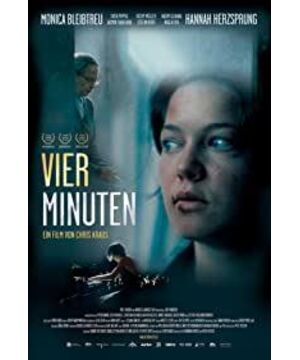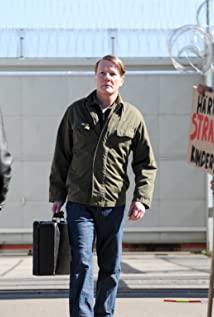What is the reason? According to my analysis, firstly, the plot is not lively, there are no beauties, and there is no passion; secondly, the film has no special skills, and lacks big scenes and big productions that are highly hyped; thirdly, the artistic taste is strong, Is a literary niche film.
Maybe it's because of my preference for art films. After scouring many DVDs, I saw the introduction of the film and thought it was an interesting film worth watching. After watching the film, it was really pleasant to see that in the last "four minutes" of the film, Mrs. Kruger, an old piano teacher (in fact, she never married) took the risk to rescue Jenny. When she performed a scene at the German Opera, it seemed that she suddenly I was deeply moved by the film. My eyes were fixed on the TV screen, and my eyes were full of tears...
Most wonderful and classic films should rely on the word "love" to impress the audience, and "Four" Minutes is such a film. At the beginning of the film, what I saw was a girl who turned a blind eye to death, shackles, and feelings, and was quite numb. I looked up to see the inmate who hanged by the head of the bed without panic, but pulled out a cigarette from the deceased leisurely. Light it up and continue to sleep peacefully. A face that is always hostile and always scarred, sometimes silent, sometimes manic, and always showing a rebellious personality. It was Mrs. Kruger who accidentally discovered that this rebellious "murderer" female prisoner was actually a musical prodigy with a talent for the piano. The heart of talent moved her, and finally, music made two people approach each other, get in touch with each other, get to know each other, and their common love for music ignited their lives. They got to know each other: Jennie was jailed for killing someone else; Mrs. Kruger was a homosexual, and at the end of World War II, her best friend was confessed to being a communist. In prison, the gallows were blown up by the US military, but they were brutally killed by the Nazis.
I think the last part of the film is a classic, when Jeni escapes from prison with the help of Mrs. Kruger to participate in the piano competition at the Deutsches Opera. Jenny walked onto the stage in a cramped manner, sat quietly on the piano bench in restraint, and started her "four-minute" wonderful "Colorful Movement". Surrounded by the prison guards who arrived, he performed the classic piano repertoire with sincerity and sincerity, and improvised the elements of black music that Mrs. Kruger disliked from the teacher. piano board, plus your own leather shoes. Moved by the plot, I feel that this eclectic and sincere performance is simply the first and the pinnacle of "romantic piano", which makes "Romantic Piano Prince" Clayderman dwarfed by comparison.
In addition, the impressive scene is that in prison, after Mrs. Kruger asked the warden to open Jenny's handcuffs and let her play the piano, Jenny was handcuffed on her back and skillfully played a song , amazing. Moreover, the meaning revealed by the film is also extremely profound. Granted, the final four minutes of the film are the finishing touches. Importantly, I saw that when Mrs Kruger went through a lot of hard work training a rebellious girl who never said "I'm sorry, please, thank you" and never "curts" to anyone into a normal person, It was strangled by the state apparatus of "strict law enforcement". At this moment, when I closed my eyes, the final scene of the film clearly appeared in my mind: after Jenny's wonderful performance, the audience responded with roaring applause. Jenny's face slowly showed an innocent smile, and just as she was bending over to curtsey for the first time to the enthusiastic audience, the police swarmed up and took advantage of the situation to put icy handcuffs on her. As described in O. Henry's novel "The Police and the Psalm", in order to get a place to spend the winter, Subei, the homeless, "tested the law" many times and was not held accountable, but when he gave up the idea of re-criminal, he was ready to start a new life on his own. At that time, the police inexplicably sent him to Blackwell Prison.
Both are brilliant satires on the seemingly majestic law and its defenders.
View more about Four Minutes reviews











